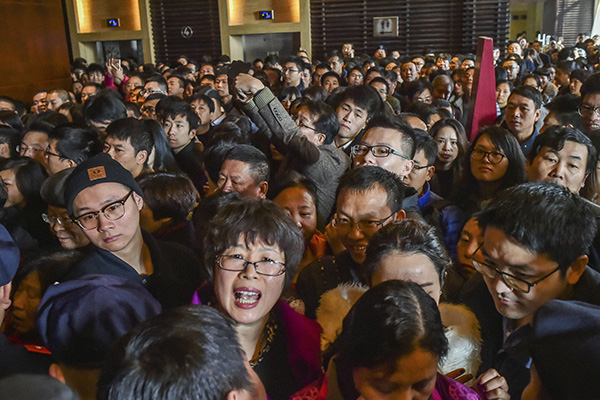Govt has vital role in curbing realty price hikes
(China Daily) Updated: 2016-03-23 08:02
 |
|
Homebuyers swarm into a hotel as a real estate company starts the sale of 388 apartments on Feb 27 in Hangzhou, Zhejiang province. The sale attracted more than 2,000 people. [Photo/China Daily] |
Since late 2015, real estate prices in metropolises such as Beijing, Shanghai and Shenzhen have been rising steadily. Several department heads of the State Council, China's Cabinet, have said recently they will strengthen measures to control the markets in these cities. Beijing Times comments:
One of the main causes of this round of property price rises has been the easing of monetary policies over the past few months. The standards for obtaining loans have been rather loose and there has been increased speculation in real estate.
Moreover, some realty agencies even offer loans to those who do not have enough money for a down payment. This is similar to subprime credit, which caused the financial crisis in the US in 2008 that evolved into a global one. It is highly risky because in case the loaner gives up the realty by ceasing to pay the loans, the bad debt ratio might abruptly rise for banks.
It is time local governments better performed their role and eliminated such illegal, highly risky financial activities.
Local governments must not interfere in local housing markets. They may use financial tools and prohibit illegal financial activities, but they should not seek to affect people's decision to buy or not to buy a house.
Fundamentally, though, it is the abundant resources in metropolises that fuel the demand for property. Thus, only comprehensive reform will curb the demand, which in turn will cool speculation. That might take years, even decades, so local governments need to better perform their roles in preventing illegal or risky behavior in the realty market.
- Upgraders lead housing rush amid bullish sentiment
- Chinese vice premier lauds housing renovation work
- Q&A: The five major social insurance programs and housing provident fund
- Ministry of housing and urban-rural development holds news conference
- CPPCC members suggest different housing policies
- Govt policies spur housing recovery in China
- Buyers in East China go on housing spree
- Market booming as housing inventory drops in cities

I’ve lived in China for quite a considerable time including my graduate school years, travelled and worked in a few cities and still choose my destination taking into consideration the density of smog or PM2.5 particulate matter in the region.










